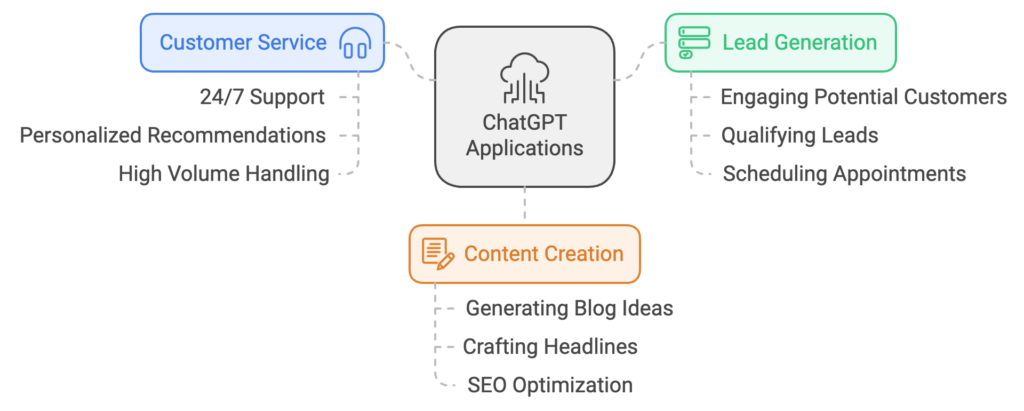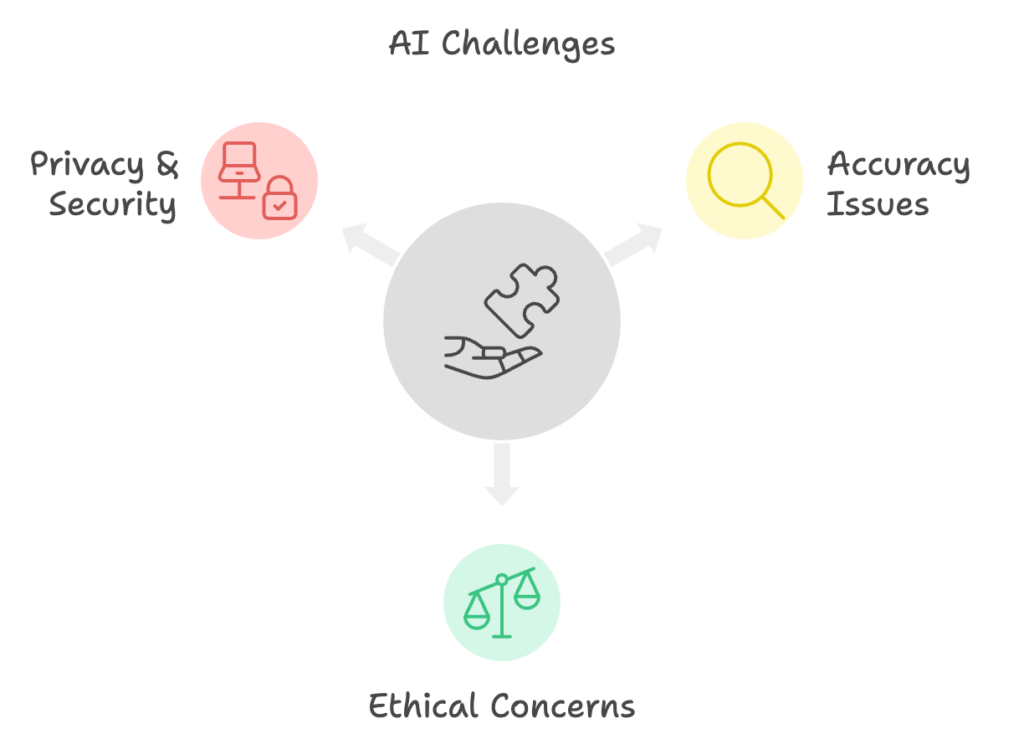Picture this: you’re at a party, and you strike up a conversation with a witty, knowledgeable stranger. You chat for hours about everything from the meaning of life to the best pizza toppings. Now imagine finding out that this fascinating conversationalist wasn’t human at all, but an AI chatbot. Welcome to the world of ChatGPT.
What is ChatGPT?
ChatGPT is a state-of-the-art AI chatbot developed by OpenAI. It’s like having a super-smart, always-available friend who can discuss any topic, answer questions, and even help with tasks like writing and coding. ChatGPT is powered by massive language models and cutting-edge machine learning, allowing it to understand context, generate human-like responses, and even learn from interactions.
Think of ChatGPT as a genie in a bottle, but instead of granting wishes, it grants knowledge and assistance. It’s a game-changer in the world of chatbots and conversational AI.
The Meteoric Rise of ChatGPT Adoption
The adoption of ChatGPT has been nothing short of phenomenal. It’s like a viral video that everyone can’t stop talking about, but instead of funny cat antics, it’s an AI chatbot that can engage in meaningful conversations.
Within just five days of its launch in November 2022, ChatGPT gained a staggering one million users. That’s like going from zero to hero faster than you can say “AI chatbot maker.”
By February 2023, ChatGPT had surpassed 100 million monthly active users, a milestone that took TikTok nine months and Instagram two and a half years to reach.
It’s clear that people are eager to embrace this new technology, with nearly half of Americans having heard about ChatGPT. However, familiarity varies by education level, with postgraduate degree holders leading the pack. Millennials and Gen Z are also more likely to have used ChatGPT compared to their older counterparts.
The Opportunities: How ChatGPT is Revolutionizing Industries
The potential applications of ChatGPT are vast and diverse, like a Swiss Army knife for industries. Here are some of the most exciting use cases:
Customer Service Chatbots: Your New BFF (Bot Friend Forever)
One of the most significant advantages of ChatGPT is its ability to provide efficient, 24/7 customer support. It’s like having a tireless, always-friendly customer service representative who never needs a coffee break.
By integrating ChatGPT into customer service chatbots, businesses can drastically improve response times, increase customer satisfaction, and handle high volumes of inquiries without breaking a sweat. ChatGPT can understand customer queries, provide relevant information, and even offer personalized recommendations, all while maintaining a pleasant and helpful demeanor.
Lead Generation Chatbots: Turning Conversations into Conversions
ChatGPT can also be a powerful tool for lead generation. Imagine having a chatbot that can engage potential customers, understand their needs, and guide them towards your products or services. It’s like having a persuasive salesperson who never sleeps and can handle multiple conversations simultaneously.
By using ChatGPT for lead generation, businesses can qualify leads, provide instant answers to common questions, and even schedule appointments or demos. It’s a smarter, more efficient way to nurture leads and drive conversions.

Enhancing Content Creation and SEO
For content creators and marketers, ChatGPT is like having a brainstorming buddy and writing assistant rolled into one. It can help generate blog post ideas, craft compelling headlines, write engaging social media posts, and even create entire articles optimized for search engines.
While human oversight and editing are still crucial, ChatGPT can significantly streamline the content creation process and help overcome writer’s block. It’s like having a secret weapon in your content marketing arsenal.
The Challenges: Navigating the Pitfalls of AI Chatbots
As with any groundbreaking technology, there are challenges and potential pitfalls to consider when it comes to ChatGPT adoption. Here are a few key issues to keep in mind:
1. Accuracy and Reliability
While ChatGPT is incredibly advanced, it’s not infallible. Like any AI system, it can sometimes generate biased or inaccurate information. It’s crucial for organizations to exercise caution when relying on ChatGPT for critical decision-making and to ensure human oversight and fact-checking.
2. Ethical Considerations
As ChatGPT becomes more sophisticated, it may become increasingly difficult to distinguish between human-written and AI-generated content. This raises questions about authorship, intellectual property rights, and the potential for misuse or manipulation.
4. Privacy and Data Security
When implementing ChatGPT in business settings, organizations must prioritize privacy and data security. Ensuring that sensitive information is protected and that the use of ChatGPT complies with relevant regulations and guidelines is paramount.

The Future of ChatGPT: Bold Predictions
As ChatGPT continues to evolve and mature, the future looks bright. Here are some bold predictions for how ChatGPT might shape the landscape of AI chatbots:
- ChatGPT will become the go-to AI chatbot maker, enabling businesses of all sizes to create powerful, customized chatbots for customer service, lead generation, and more.
- The integration of ChatGPT with other AI technologies, such as voice assistants and computer vision, will create even more immersive and intuitive conversational experiences.
- ChatGPT will play a crucial role in democratizing AI, making it accessible and usable for a wider range of people and industries.
Finally…
The rise of ChatGPT represents a new era in AI chatbots, one filled with incredible opportunities and exciting challenges. As businesses and individuals continue to explore the potential of this powerful technology, it’s essential to approach it with a mix of enthusiasm and caution.
By harnessing the power of ChatGPT for customer service, lead generation, content creation, and more, organizations can unlock new levels of efficiency, engagement, and growth. However, navigating the ethical, accuracy, and privacy considerations will be crucial to ensuring the responsible and sustainable adoption of ChatGPT.
As we look to the future, one thing is clear: ChatGPT is here to stay, and its impact on the world of AI chatbots will be nothing short of transformative. So buckle up, folks – it’s going to be a wild ride!
Before you go….
Introducing ChatCube: Your Personal ChatGPT Trainer
Now, imagine having the power of ChatGPT at your fingertips, but tailored specifically to your business needs. Enter ChatCube, the superhero of custom chatbot creation.
1. No-Code, No Problem
With ChatCube, you don’t need to be a tech wizard or have a PhD in AI to create your own ChatGPT-like chatbot. It’s like having a magic wand that conjures up chatbots in less than 5 minutes. ✨
2. Trained on Your Own Data
The best part? ChatCube allows you to train your chatbot on your own data. It’s like sending your chatbot to a personalized school where it learns everything about your business. 🎓
3. Customer Support Superhero
Imagine having a tireless, always-available customer support agent that can answer questions just like ChatGPT. That’s what you get with ChatCube. Your chatbot will handle customer inquiries with the finesse of a superhero, and when it encounters a question that stumps even its mighty AI brain, it can seamlessly hand off the conversation to a human agent. It’s like having a dynamic duo of AI and human support!
4. Lead Generation Magnet
But wait, there’s more! ChatCube chatbots are also lead generation magnets. They can attract potential customers, engage them in conversation, and guide them towards your products or services like a friendly neighborhood guide. 🧭
5. Easy Retraining, Endless Improvement
As your business grows and evolves, so can your ChatCube chatbot. With just a single click, you can retrain your chatbot on new content, ensuring it stays up-to-date and relevant. It’s like giving your chatbot a superhero serum that keeps it at the top of its game. 💪
So, if you want to harness the power of ChatGPT for your business without the hassle, ChatCube is your trusty sidekick. Get ready to create chatbots that will make your customers say “Wow!” and your leads say “Sign me up!”
Who uses ChatGPT the most?
According to recent studies, millennials and Gen Z are the most likely to have used ChatGPT, with adoption rates of 35% and 29%, respectively. However, ChatGPT is gaining popularity across all age groups and demographics.
When did ChatGPT gain popularity?
ChatGPT took the world by storm when it was launched in November 2022. Within just five days of its release, it gained an astonishing one million users, making it the fastest-growing consumer application in history.
What profession uses ChatGPT the most?
While ChatGPT is being adopted across various industries, it has been particularly popular among content creators, marketers, and customer service professionals. Its ability to generate human-like text and assist with tasks like content creation and customer support has made it a valuable tool in these fields.
What companies will benefit most from ChatGPT?
Companies that heavily rely on customer interaction, content creation, and lead generation are likely to benefit the most from ChatGPT. This includes e-commerce businesses, digital marketing agencies, and customer service-oriented organizations. However, the potential applications of ChatGPT are vast, and businesses across all sectors can find ways to leverage its capabilities.





